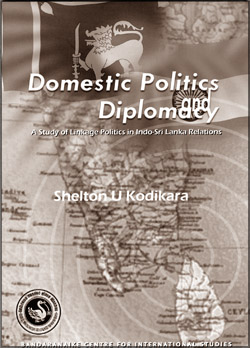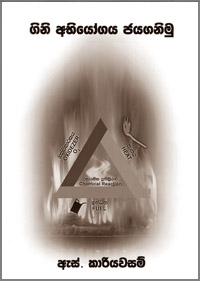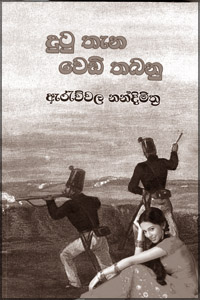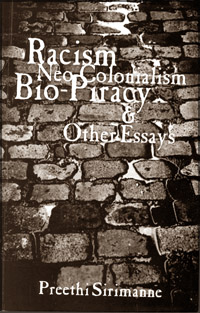|

Realistic approach to Indo- Lanka relations
Reviewed by Prof. W.I. Siriweera
This valuable book completed by Shelton Kodikara in 1994 and
posthumously published by the Bandaranaike Centre for International
Studies (BCIS) recently, adds to the understanding of Indo- Sri Lanka
relations in a realistic framework.
 Almost
all available primary sources have been thoroughly perused by the author
for the compilation of the book. Almost
all available primary sources have been thoroughly perused by the author
for the compilation of the book.
They range from Sri Lankan, Indian, Australian, American and British
newspapers to the House of Representatives d ebates, debates in the Lok
Sabha, documents of the Ministry of Defence and External Affairs and
personal correspondence between leaders of India and Sri Lanka. The use
of these original sources indicates the extent of research that has gone
into the publication.
The book deals with Sri Lankan foreign policy in relation to India in
the post- independence era up to May 1990. It begins with a chapter
which focuses on the theoretical perspectives of the linkage between
domestic politics and foreign policy. In this chapter, the author
illustrates how internal compulsions decide foreign policies of states,
although interactions of other states and personalities and the vision
of leadership have some bearing on the final decisions. As far as
Indo-Sri Lanka relations are concerned he avers internal variables had a
greater determining influence than other factors largely due to
geo-political reasons.
The author states that, the 'fear psychosis' of Sri Lankan leaders
over presumed Indian dominance, particularly during the regimes of three
UNP Prime-Ministers from 1948 to 1956, namely D.S. Senanayake, Dudley
Senanayake and John Kotelawala. The signing of the Defence and External
Affairs agreements with Britain by D.S Senanayake, Citizenship problems
of ethnic Indians and the abortive attempts to sort out the problem by
D.S Senanayake and John Kotelawala, disputes over maritime boundaries
and agreements reached thereupon are discussed in detail in the next
chapter.
The author goes on to state that, the alternative conception of Sri
Lanka's defence and security inaugurated by S.W.R.D Bandaranaike in 1956
influenced Sri Lanka's foreign policy decision making for the next 21
years until 1977. This era straddled three SLFP dominated regimes as
well as the UNP coalition rule of 1965- 1970 period. In this conception
India was no longer considered a potential threat to Sri Lanka's peace
and security. A low level of mutual suspicion and very close cooperation
between the two countries were witnessed during this period.
In chapter 3, the author contends that apart from domestic politics
there have been instances where personal identities were an important
variable in Indo- Lanka relations. In his view the tradition of
goodwill, close friendship and cooperation initiated by Jawaharlal Nehru
and S.W.R.D. Bandaranaike and carried on by their successors Indira
Gandhi and Sirimavo Bandaranaike have been of considerable importance in
the Indo-Sri Lanka equation. The solution of the citizenship issue of
975,000 stateless persons of Indian origin through Indo- Lanka
agreements of 1964 and 1974, Maritime Boundary agreements of 1974, which
settled the question of Kachchathivu Island and Indian assistance during
the 1971 insurgency have been cited as good examples of this phenomena.
As a fitting tribute to all this, the author has respectfully dedicated
the book to the stateswoman par excellence, late Madam Sirimavo
Bandaranaike.
Later on the author critically examines how domestic politics have
affected the implementation of the Indo- Lanka Accords of 1964 and 1974,
which brought out a satisfactory solution to the citizenship issue. He
asserts that political expediency and desire to obtain the vote of the
estate Tamil population determined the attitude of the UNP governments
to slow down the implementation of the agreements.
An evaluation of the manner in which Indo- Sri Lanka relations
changes due to domestic politics in both countries after J R Jayewardene
assumed power in 1977, particularly from 1989 onwards, occupies a large
part of this publication.
The refugee issue and Tamil Nadu political dynamism gave India a
handy leverage to intervene in Sri Lankan affairs and a rationale to
justify its involvement before the international community. But, it is
now well known that even before the refugee issue grew as a problem to
India, since the 1983 July riots, India's RAW was arming and training
Sri Lankan Tamil guerillas.
Professor Kodikara explains Indian policy in the light of broader
systemic compulsions of Indian domestic politics. He states "A pervasive
Indian conception, that Sri Lanka lay within India's security perimeter,
and that foreign influences in Sri Lanka could potentially jeopardize
India's strategic interests, has been matched by widespread belief in
Sri Lanka, that India itself was the most proximate threat to its own
security. The mutuality of threat perception is best exemplified in the
circumstances attending the negotiation of the Indo- Lanka agreement of
July 1987.
India's threat perceptions were cantered on several issues. They were
alleged offers of base facilities to the US Navy in Trincomalee, the
soft peddling of the Indian Ocean as a Peace Zone proposal, the refusal
of J.R. Jayewardene regime to denounce the existence of super power
bases in the Indian Ocean at a meeting of the non- aligned movement,
mishandling of the Trincomalee Oil Tank Farm project tender, noticeable
increase of port call visits of the US Navy to Trincomalee and the
agreement to hand over 600 acres of land north of Colombo to the Voice
of America Broadcasting service.
As Gamini Keerawella has pointed out in an article, the Indian threat
perception vis-a-vis Sri Lanka was imaginary or actual is not really the
issue. What is relevant here is that India perceived those actions of
its southern neighbour as a security threat.
As long as India entertained such perceptions its policy towards Sri
Lanka became reactive to the perceived security threats.
The Indian decision makers viewed that Sri Lanka's issue as its
'Achilles Heel' which could be used to check and control such adverse
moves taken by Sri Lanka and steer Sri Lanka's foreign policy in a
manner favourable to India.
The resulting Indo- Lanka Accord of July 29,1987 and the arrival of
the IPKF, according to Prof. Kodikara curtailed Sri Lanka's ability to
pursue an independent foreign policy.
He avers that J.R. Jayawardena's "short-sighted pproach vitiated the
success of his negotiations with India from the very beginning "and it
is the subject of the next two chapters of the book.
The book has been edited by W.B. Dorekumbura and he has done an
excellent job in editing the publication. On the whole this publication
is yet another land mark in the list of achievements of the BCIS.
Fine guide on fire precautions
 Gini
Abhiyogaya Jaya Ganimu by S. Kariyawasam is an attempt made writer to
create an awareness and provide necessary instructions regarding fire
precautions. Gini
Abhiyogaya Jaya Ganimu by S. Kariyawasam is an attempt made writer to
create an awareness and provide necessary instructions regarding fire
precautions.
In the event of a sudden fire, one should not wait until help comes
from outside, which may take sometime. It is mainly due to the ignorance
in handling these equipment that the fire spreads without contro in many
instances. So Kariyawasam's book is a fine guide book for almost
everyone.
S.Kariyawasam, who joined the Petroleum Corporation Refinery at
Sapugaskanda in 1969 as a member of the start up team, had worked there
for 36 years until his retirement as the Fire and Safety Superintendent.
Though fire extinguishers are available in almost all places of work,
only a few are competent to handle such equipment properly. Most of the
people's attitude towards fire and safety is unsatisfactory.
At many work places, according to the author, the attitude of the
Management is also unsatisfactory with regard to fire. So the
publication of such a book is quite timely.
In order to create an awareness and provide necessary instructions
regarding fire precautions, the author first tries to create a positive
attitude regarding fire.
The book clearly explains the physical and scientific aspects of
fire. Also the functions and uses of respective fire extinguishing
equipment, the manner in which they should be handled have been
explained clearly and scientifically.
The author has given priority to cylinder type fire extinguishers,
which are readily available in most places.

Story of patriotism and love
Title: Dutu Thana Wedi Thabanu
Author: Erawwala Nandimithra
The period during the first world war, provides the background for
renowned novelist Erawwala Nandimithra's latest fiction Dutu Thana Wedi
Thabanu. Anyway in his preface he emphasizes that the book is not an
analysis of the riots of 1915, but solely a fiction.
Love isthe 'ray of light' that lights up one's life. Even during a
period where there is martial law, that ray of light sruggles to shine
on its own. The book brings to us a heartrending story. We see the way
such a 'ray of light' is forcibly blown out- amidst the cruel external
atrocities. The book also reminds people of one of their prime duties-
to love and respect their motherland.
Many facets of human civilization in peril
Title:Racism Neo Colonialism Bio-Piracy and Other Essays
Author: Preethi Sirimanne
 As
mentioned in the back cover of the book ,Preethi Sirimanne's "Racism,
Neo Colonialism Bio-piracy and Other Essays" examine the many facets of
a human civilization in peril manifested in a endless chaos of wars,
rebellions, military conquests and an economic crisis that is engulfing
every country in the world. "The root cause of these are the actions of
Western powers who try to colonize countries through arm,ed
interventions as apparent in Iraq and Afghanistan and through
neo-liberal policies that prioritize profit over people." As
mentioned in the back cover of the book ,Preethi Sirimanne's "Racism,
Neo Colonialism Bio-piracy and Other Essays" examine the many facets of
a human civilization in peril manifested in a endless chaos of wars,
rebellions, military conquests and an economic crisis that is engulfing
every country in the world. "The root cause of these are the actions of
Western powers who try to colonize countries through arm,ed
interventions as apparent in Iraq and Afghanistan and through
neo-liberal policies that prioritize profit over people."
She writes in her preface that "Most postcolonial states that became
independent are still experiencing the continuation of discrimination
and exploitation. Although European empires collapsed, the ideologies
and theories that helped to build and expand these empires did not
disappear. Concealed forms of racism, exploitation, and domination
contribute to the survival of colonialism."
It is a publication of Sarasavi Publishers (PVT) Ltd.
Under four main chapters and several different sub headings under
each chapter Preethi deals with the ideologies and attitudes that
prevailed during colonial times and highlights the features of today's
Neo-Colonialism.
Preethi is a freelance journalist living in Germany.
E-Mail - [email protected] |

